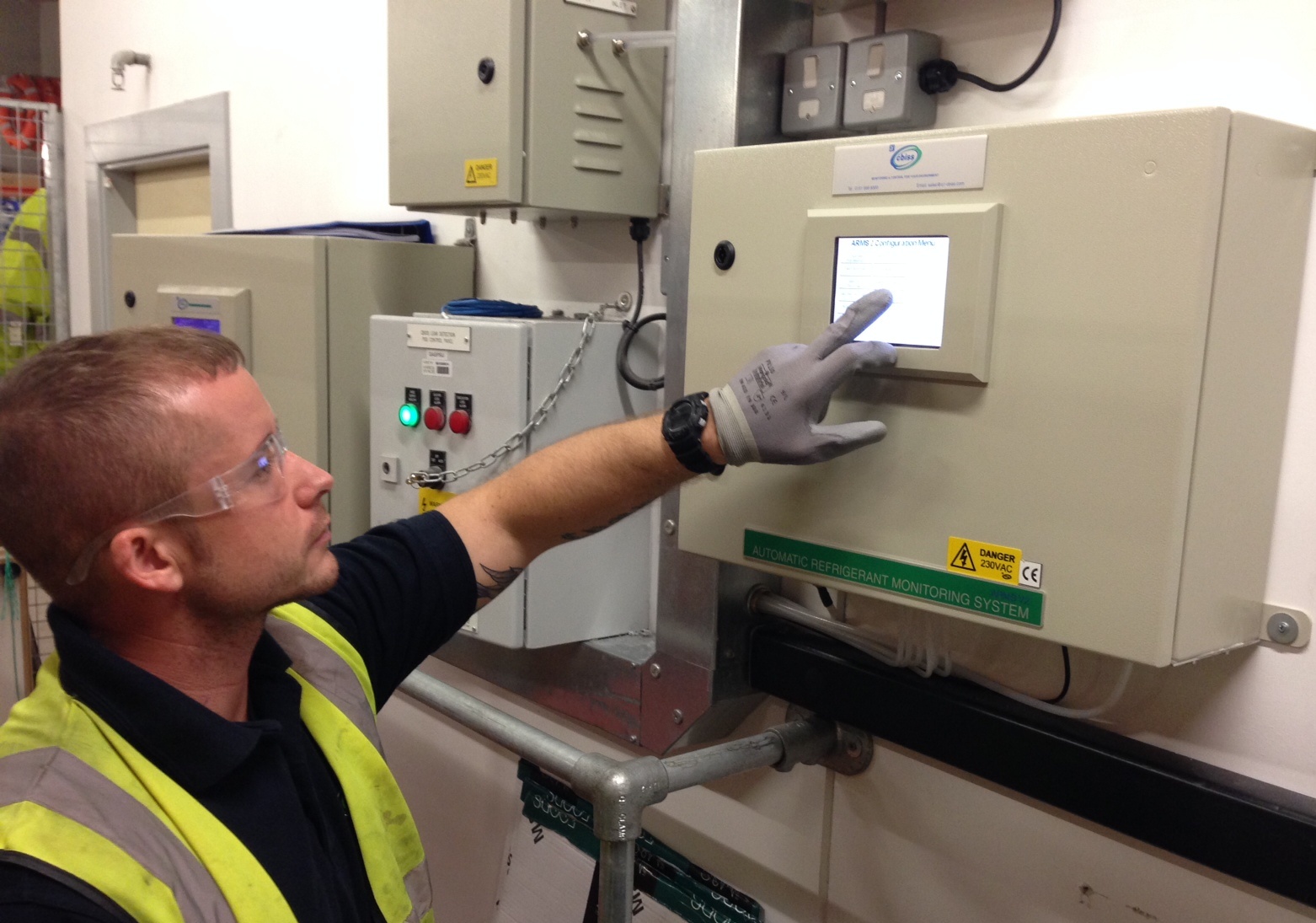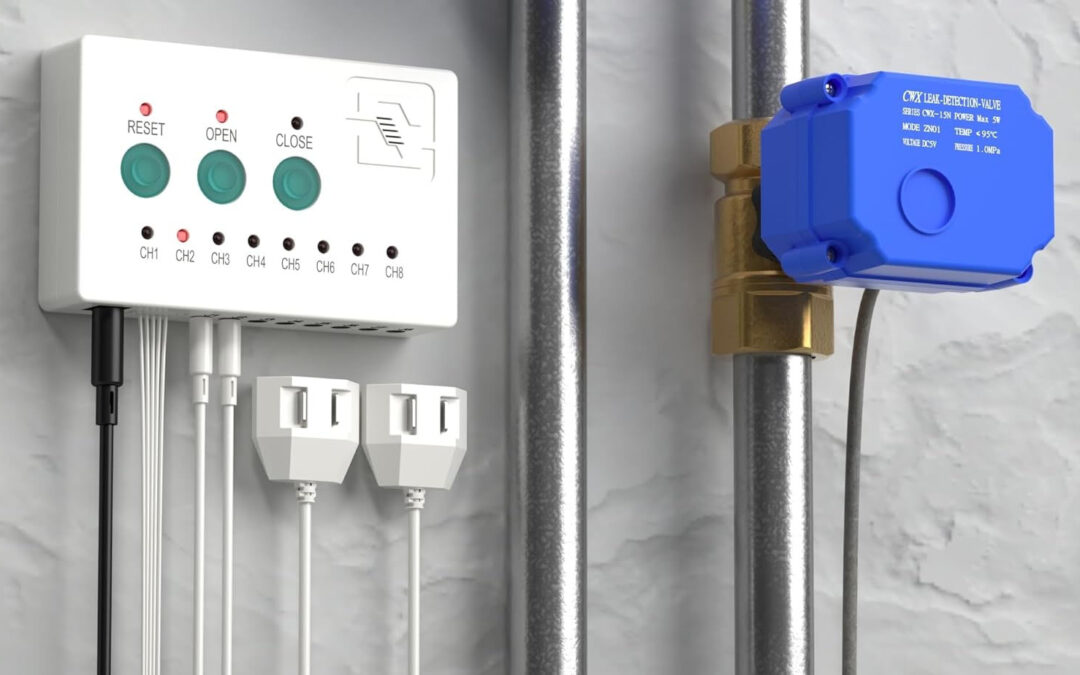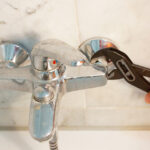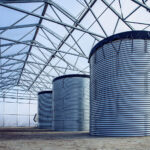How Do Leak Detection Systems Work?
What Is a Leak Detection System?
![]() Leak detection systems are a set of devices designed to find and alert you to water leaks as early as possible. Some also take action automatically shutting off your water supply to prevent further damage.
Leak detection systems are a set of devices designed to find and alert you to water leaks as early as possible. Some also take action automatically shutting off your water supply to prevent further damage.
It’s like having a security system, but for your plumbing.
For a deeper understanding, you might find our article on What is Water Leak Detection? insightful.
The Growing Need for Leak Detection Systems
Leaks can cause serious damage. We’re talking mould growth, structural rot, ruined flooring, and insurance nightmares.
Whether it’s a slow drip under the sink or a burst pipe in the attic, early detection makes all the difference.
As homes and commercial properties become more tech-savvy, leak detection is quickly moving from luxury to necessity.
Types of Properties That Benefit from Leak Monitoring
-
Residential homes (especially villas and multi-storey properties)
-
Commercial offices and warehouses
-
Hotels and serviced apartments
-
Data centres and critical infrastructure
-
Schools, hospitals, and government buildings
Anywhere water is flowing, there’s risk and a need for protection.
For specific insights on leak detection in apartments, refer to our article on Water Leak Detection for Apartments.
Main Components of Leak Detection Systems
Sensors
 The core of any leak detection setup. These sensors are what actually “detect” water.
The core of any leak detection setup. These sensors are what actually “detect” water.
-
Spot Sensors – These sit on the floor and trigger when water touches them.
-
Cable Sensors – These cover larger areas, detecting moisture along their entire length.
Control Panel or Hub
This is the brain. It receives signals from the sensors and decides what happens next. Think of it as mission control for leak prevention.
Shut-off Valves
Found in more advanced systems, these valves automatically close the main water supply if a leak is detected stopping the flow instantly.
Alerts and Notifications
Once a sensor detects a problem, the system sends an alert. This can be:
-
A siren in the house
-
A text or push notification to your phone
-
An alert sent to a monitoring company
How Leak Detection Systems Actually Work
Sensing Moisture or Flow Anomalies
 The sensors keep an eye on areas where leaks commonly occur beneath sinks, near water heaters, behind toilets, or along pipes.
The sensors keep an eye on areas where leaks commonly occur beneath sinks, near water heaters, behind toilets, or along pipes.
Some systems also monitor flow rates and patterns. If water usage seems odd like running continuously overnight the system flags it.
Analysing Data in Real-Time
Smart leak detection systems analyse all the incoming data and compare it to normal usage. If something’s not right, they act fast.
Automatic Water Shut-off
If there’s a confirmed leak, some systems shut off the water at the main valve within seconds. No human needed.
User Notifications
You get real-time alerts via mobile app, text message, or email. This keeps you in control, even when you’re not home.
Different Types of Leak Detection Systems
Active vs Passive Systems
-
Passive Systems just detect leaks and sound alarms.
-
Active Systems also shut off the water supply.
Whole-Home Monitoring
These systems keep tabs on the entire water system—every tap, appliance, and pipe.
Appliance-Specific Detectors
Placed under dishwashers, fridges, or washing machines, these target common problem areas.
Wireless vs Wired Systems
 Benefits of Wireless Detection
Benefits of Wireless Detection
-
Easier to install
-
Ideal for retrofits or rented properties
-
Portable and flexible
When a Wired System Makes Sense
-
Permanent installations
-
Properties under construction
-
Long-term durability and reliability
Smart Leak Detection Technology
Integration with Smart Home Devices
Link your leak detection to Alexa, Google Home, or Apple HomeKit for voice commands and automations.
Using Apps and Remote Control
View sensor status, receive alerts, and shut off water remotely with a tap on your phone.
For more on integrating leak detection with smart systems, see our article on Smart Protection: Integrating Water Leak Detection.
Cloud-Based Monitoring and Reporting
Some systems store water usage history, detect slow leaks over time, and provide detailed reports for insurance or landlords.
Benefits of Installing a Leak Detection System
Preventing Water Damage
Early alerts help you stop problems before they escalate—saving thousands in repairs.
Saving on Water Bills
Leaks add up. Even a tiny drip wastes litres a day. Fixing them early cuts your costs.
Peace of Mind for Property Owners
Leave for work or holiday knowing your home is protected.
Protecting Hard-to-Reach Areas
Leak detectors can sit under floorboards, in basements, and crawl spaces, places you rarely check.
For practical tips on preventing leaks, check out our article on Top Tips for Preventing Leaks in Your Home or Business.
Installation and Maintenance
DIY vs Professional Installation
Many systems today are easy to install yourself, but complex setups (especially those with shut-off valves) may need a plumber or technician.
How Often to Test and Replace Batteries
Check systems monthly. Replace batteries in wireless sensors every 6–12 months, depending on manufacturer guidelines.
How to Choose the Right System for Your Property
Size and Layout of the Property
Larger buildings may need multiple sensors or a zoned approach.
Budget and Desired Features
Basic systems start cheap. Add smart features, and the cost goes up—but so does peace of mind.
Insurance and Compliance Considerations
Some insurers offer discounts for properties with leak detection systems. It’s worth checking.
Common Misconceptions About Leak Detection System
“They’re only for large buildings”
Wrong. Even a studio flat can suffer from an undetected leak. Small homes benefit just as much.
“They’re expensive and hard to install”
Not anymore. With plug-and-play options available, you can set up a system in an afternoon.
For more on debunking myths, read our article on Common Leak Detection Myths Debunked.
Conclusion
Leak detection systems aren’t just gadgets; they’re essential tools for modern property protection.
Whether you’re in a high-rise, villa, or office block, early detection means lower bills, less stress, and a safer space.
Frequently Asked Questions
1. Can leak detection systems detect hidden pipe leaks inside walls?
Yes, some systems monitor flow rates to catch these slow, hidden leaks.
2. Do I need Wi-Fi for my leak detection system to work?
Not always. Basic models work without it, but smart systems need Wi-Fi for remote alerts and app control.
3. How many sensors do I need?
It depends on your layout. Most homes need 4–8 sensors for full coverage.
4. Can I get insurance discounts with a leak detection system?
Some insurers do offer lower premiums. Check with your provider.
5. What’s the lifespan of a leak detection system?
Most systems last 5–10 years. Replace batteries and test them regularly to keep things running smoothly.





